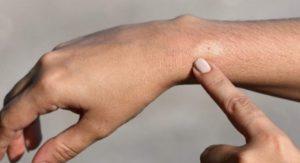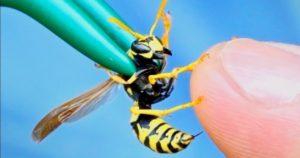Poisonous wasps: what is the danger of an insect bite and what should be done immediately
In the warm season, the bites of various insects are far from uncommon. Most often, a person is bitten by wasps, bees and mosquitoes. As you know, wasp stings represent the greatest danger to human health.
Content
What is wasp venom made of?
Wasp venom is a toxic substance that contains several different components. Among them there are those that are useful for the body.
By itself, it is a hormone that is responsible for the production of happiness and mood in the human body. But it also has negative sides - it causes an allergic reaction, it can provoke inflammatory processes.
These are substances that regulate many processes in the body - digestion, pressure, the appearance of certain hormones. They also have antitumor and even analgesic effects.
Organic substances, which are an important component of almost all systems.
A toxic drug that causes paralysis, disrupts nerve response and muscle function. From its impact, the bite site becomes numb, and with a large amount, muscle activity is affected.
An enzyme that can disrupt blood clotting, destroy tissue cells.
A substance that provokes edema, inflammation and swelling. But in large quantities it is something that can resist the appearance of various oncological tumors.
A compound that is in the body, but its excess can cause swelling, blood clotting, muscle spasms. But there is also a benefit - it can stimulate stagnant processes, reduce pressure.
An organic compound that has a positive effect - stimulates peristalsis, constricts pupils, pressure, slows down heart contractions. But in large quantities it has a number of side effects.
This is a high blood glucose syndrome. Because of this, there is a strong thirst, dry mouth, arrhythmia and a feeling of fatigue.
Signs of a wasp sting
Wasps are quite aggressive insects and often attack without warning or special reason. The main symptoms of a wasp sting are:
- severe severe pain;
- the appearance of swelling at the site of the bite;
- redness of the skin around the bite.
In most cases, wasp stings are limited to only these symptoms, and the pain disappears after 2-3 hours.
However, about 1 in 100 people bitten will have a severe allergic reaction that can even be fatal. A signal that the life of the bitten is in danger is appearance of the following symptoms:
- severe swelling that increases;
- the appearance of a rash and itching all over the body;
- nausea and vomiting;
- labored breathing;
- pulse instability;
- dizziness;
- convulsions;
- loss of consciousness.
First aid for wasp sting
First of all, after a bite, it is necessary to carefully examine the wound for the presence of sting. Many people confuse wasps and bees because of their resemblance. At the same time, bees are able to sting a person only once, after which they die, leaving their sting inside the wound.
Wasps can sting a person more than once and, accordingly, they do not leave their sting at the site of the bite.
If, nevertheless, a sting was found, then it should be carefully pulled out with tweezers or another improvised tool, but in no case should the sting be squeezed out. After removing the sting, the procedure for wasp and bee stings is similar:
- decontamination of the wound with alcohol, peroxide or other alcohol-containing liquid;
- applying a tight bandage from a sterile bandage;
- applying ice to the bite site to relieve pain;
- drinking large amounts of water.
Why wasp stings are dangerous
The greatest danger to humans is the bites of wasps in the neck, face, tongue, eyes and peripheral nerves, or the application of several successive bites at once. Such bites can lead to terrible consequences for human health, such as:
- optic neuritis;
- malignant myasthenia gravis;
- airway obstruction;
- development of anterior capsular cataract;
- glaucoma;
- atrophy of the iris;
- generalized polyneuropathy;
- lens abscess.
Wasp venom benefits
In a small amount, wasp venom is beneficial for the body. It stimulates the immune system, accelerates the processes of metabolism and regeneration of body tissues. But it's best not to use it on your own.
However, there are benefits from wasp venom. For example, from poison brazilian wasp, make special drugs that fight cancer cells. A vaccine for allergy sufferers is also used, based on wasp venom. It helps to increase the amount of antibodies in the body to reduce allergic manifestations.
https://youtu.be/sqKeat0q0j0
Conclusion
For most people, wasp venom in small quantities does not pose a serious threat, and their unpleasant symptoms completely disappear after a few days or even hours. However, the substances contained in its composition are quite dangerous and in some cases can endanger not only health, but also human life.
Previous
